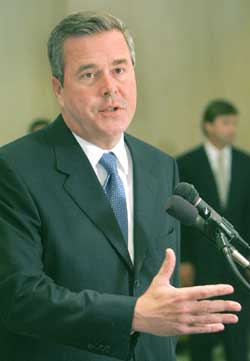| Home | Blog | Ask This | Showcase | Commentary | Comments | About Us | Contributors | Contact Us |

Why did Jeb Bush attack the New York Times so viciously?COMMENTARY | June 172, 2005What's behind his letter to the editor, saying the Times has a 'grotesque and chilling disrespect for the sanctity of life?' And how should the Times and other media organizations respond to attacks like these? By Barry Sussman Q. What does Bush stand to gain by attacking the Times? Q. The Times published Bush’s letter. Should it have? Q. And should other news organizations respond to such outrageous charges against one of its greatest institutions? Florida governor Jeb Bush is taking some heat for requesting – and getting – a state’s attorney’s office to investigate whether Michael Schiavo phoned 911 promptly 15 years ago when he found his wife, Teri, stricken and collapsed on a floor. In fact, Bush has been getting an earful. For example, in an editorial on June 21, The Miami Herald wrote “shame on Gov. Jeb Bush," and said his “stunningly arrogant” request helped “make a mockery of state law.” But there was another offensive action by Bush in the days following the June 15th autopsy on Terri Schiavo that is equally outrageous and more to the concern of this Website. It was a vicious, unfounded attack on the New York Times. In a letter published in the Times on June 18th, Bush accused the Times of having a “grotesque and chilling disrespect for the sanctity of life.” He described himself, on the other hand, as someone who “will continue to strive to protect our most vulnerable citizens.” The letter purportedly was in response to a Times editorial two days earlier that said the Schiavo autopsy “should embarrass all the opportunistic politicians and agenda-driven agitators who meddled in Terri Schiavo’s right-to-die case.” Only one politician – Senate majority leader Bill Frist – was named in the editorial but Bush had ample reason to think he also was a target. After the first paragraph, the Times editorial was mostly a bland recounting of the autopsy findings. So the appearance, at least to me, is that Bush was simply spoiling for a fight with the Times. I’d say his aim was to keep up the pounding on the Times and other occasionally aggressive news organizations practiced by his father and brother George W., along with radio and cable TV extremists and some other Republican politicians. The appeal is to right-wing and religious fundamentalists, the swing voters of this new century. And also, perhaps, to the growing numbers who distrust the media altogether. While extremely vicious, Bush’s words are part of a recognizable pattern. What’s more unclear to us is how the Times, other news organizations and leaders who may be disgusted by Bush's base attack should respond. Did the Times feel obligated to publish such a letter? If so, why? On the day of Bush’s letter, the Times wrote another Schiavo editorial, this one singling out Bush for his call for an investigation of Michael Schiavo’s initial reaction in 1990. “It was heartbreaking to see Gov. Jeb Bush thrust himself back into this tragedy,” the editorial said. “Of all the politicians who tragically failed to understand and respect the sanctity and privacy of family life in this case, only Mr. Bush seems determined to save face by disturbing the family's peace further and berating those who had been saying all along that he was going down a terrible road.” The Times didn’t respond specifically to Bush’s outrageous charge of harboring a grotesque disrespect for the sanctity of life. But it didn’t need to; the second editorial put Bush in the right perspective. Does Bush care? Probably not. He was looking for this fight, after all. But he might care if there were something of an outcry from the press at large, and from leaders in other fields – especially from figures on the religious right, who may eventually tire of this game. Or have we gotten to the point where someone like Bush can call the newspaper of record's editorial board monstrous names like this, and it's not much news? Is the political discourse so debased? Is it open season on newspapers, any weapon OK?
|
||||||||||||




